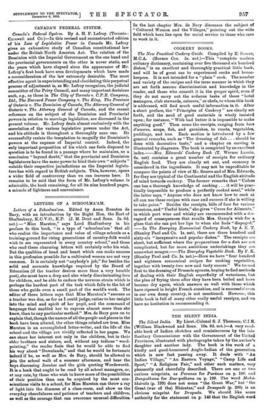LETTERS OF A SCHOOLMA'AM.
Letters of a Schoolma'am. Edited by Anna Bunston de Bary, with an introduction by the Right Hon. the Earl of Shaftesbury, K.C.V.O., K.P. (J. M. Dent and Sons. 2s. 6d. net.) —" Miss Marston," says Lord Shaftesbury in his preface to this book, "is a type of schoolum'am ' that all who realize the importance and value of village schools as a training-ground for rising generations of country-folk would wish to see represented in every country school," and those who read these charming letters will certainly echo his wish. But the qualities of head and heart which can make success in this profession possible for a cultivated woman are not very common. It is certainly not "anybody's job," for besides the solid and accurate knowledge required by the Board of Education (if the teacher desires more than a very humble post), she must have a deep and also wisely discriminating love for children, and be able to endure the nervous strain which is perhaps the hardest part of the task which falls to the lot of those who guide even a small part of the world's work. The editor of these letters says that Miss Marston's "success as a teacher was due, as far as I could judge, rather to her insight into the mind and spirit of her pupil, and the command of language that enabled her to express almost more than she knew, than to any particular method." Mrs. de Bary goes on to explain that, though the names of all the people and places in the book have been altered, the other things related are true. Miss Marston is an accomplished letter-writer, and the life of the school and the village are vividly reflected in her pages. We can share her interest not only in the children, but in their elder brothers and sisters, and, without any tedious "word- painting," the reader feels that he would be able to find his way about "Downlands," and that he would be fortunate indeed if he, as well as Mrs. de Bary, should be allowed to join the school walk of a summer afternoon, and hear the boys discussing Ivanhoe and the girls quoting Wordsworth. It is a book that ought to be read by all school managers, or, at any rate, by those who wish to know more of the possibilities of their position than can be acquired by the most con- scientious visits to a school, for Miss Marston can throw a ray of light into the dimness of a class-room, and show us the everyday cheerfulness and patience of teachers and children, as well as the courage that can overcome unusual difficulties. In the last chapter Mrs. de Bary discusses the subject of "Cultured Women and the Villages," pointing out the wide field which here lies open for social service to those who care to work in it.


































































 Previous page
Previous page